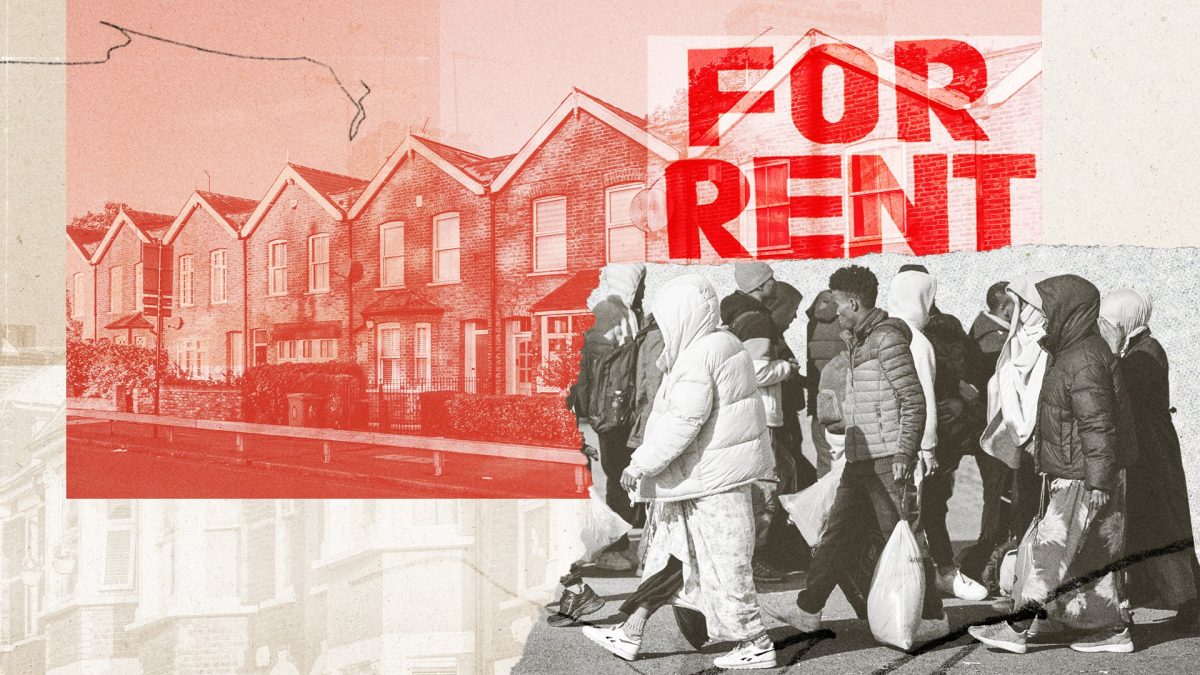Some landlords have said they are proud to house vulnerable people but there are fears it could worsen the housing crisis
Britain’s landlords are choosing to house asylum seekers instead of private renters because it can be more lucrative and easier to manage, The i Paper has been told.
Property owners are becoming increasingly attracted to steady, long-term income from taxpayer-funded deals to house asylum seekers, industry insiders say.
Most of the landlords’ costs and responsibilities are handed over to third-party providers, such as Serco, under the Home Office-backed contracts.
This comes as Labour brings in new laws to give renters greater security while also closing asylum hotels. Property experts have warned that the legislation could backfire by pushing landlords to sell up or look for other revenue options over fears it will make dealing with typical private renters a hassle.
Property influencers on YouTube and TikTok are also talking up the option of housing asylum seekers as more profitable than professionals or students, which could encourage more landlords to move away from traditional tenancies.
Critics claim this risks worsening the housing crisis for renters by reducing the supply of available properties – and heightening tensions in communities.
It lays bare the scale of the challenge facing Labour when it comes to tackling the housing crisis as it closes asylum hotels. The Government said it is looking at other options for housing asylum seekers, including industrial and ex-military sites.
New FeatureIn ShortQuick Stories. Same trusted journalism.
One Nottinghamshire landlord with several houses in multiple occupation (HMOs) told The i Paper he was “proud” of housing vulnerable asylum seekers, adding that he welcomed the “stability” of the set up.
HMOs refer to homes that are rented out to multiple people who are not in the same household. They have separate bedrooms but may share a kitchen or bathroom.
Red wall Labour MPs in the north and Midlands told The i Paper they are worried about the growth of asylum HMOs in their constituencies – following increasing tensions over asylum hotels.
Asylum seekers in the UK tend to go to hotels first, before being moved into longer-term “dispersal accommodation” in the community – including HMO flats.
Tens of thousands of asylum seekers are already living in these kinds of flats but experts expect the proportion of people housed in the community to grow, as Labour tries to close more asylum hotels.
Official figures show that 32,000 asylum seekers are in hotels. But around twice that number, just over 66,000, are in dispersal accommodation.
One think-tank analysing Labour policies said moving more asylum seekers into HMOs was a “tinderbox that will go badly wrong”, because low-income voters struggling to find housing could resent migrants.
Reform UK said it was “morally corrupt” for landlords to exploit the asylum accommodation crisis. Nigel Farage’s party also blamed Labour’s legislation for “pushing” owners into these tenancy deals.
Serco: ‘Calling all landlords’
Labour Renters’ Rights Bill is expected to come into force in early 2026 after receiving royal assent this autumn. It will boost private tenants’ rights to challenge unreasonable rent increases as well as banning no-fault evictions. This will prevent unscrupulous landlords using rent hikes as a “backdoor” means of eviction.
Campaigner say it is a vital piece of legislation that will give greater housing security to renters, protecting them from soaring rents and poor housing conditions.
Property owners are preparing for these new controls at the same time as large Home Office contractors – Serco, Mears Group and Clearsprings Ready Homes – are encouraging landlords to house asylum seekers. Serco put out a “calling all landlords” message on its website in April.
The three big asylum providers agree with the Home Office to meet basic housing conditions. The landlord hands over their property to the provider after signing a long-term lease, typically three or five years.
Labour is pushing to close asylum hotels by 2029 – and experts say pressure is being shifted onto the private rented sector.
Paul Shamplina, the founder of Landlord Action, said he knew of HMO owners opting for deals with asylum contractors – at least partly because of the Renters’ Rights Bill.
“Landlords are fearful of the bill and some are turning to this scheme,” said Shamplina, who provides legal advice to landlords. “The legislation is definitely a factor.”
He added: “Some landlords won’t sign up for it, ethically, because they are aware there is a shortage of rental stock for other people in the community – students, professionals and others. Landlords have to make their own mind up whether it suits them.”
Wendy Whittaker-Large, who runs the HMO Action Group and advises people with HMO portfolios, said she knew “dozens” of landlords who had agreed five-year leases with Serco and other asylum providers this year.
Many of them cited the Renters’ Rights Bill as a factor for their decision, she claimed. Since Home Office contractors are responsible for moving migrants in and out, landlords do not have to worry about Labour’s eviction controls.
Whittaker-Large said landlords like the guarantee of rent every month with no “void” periods, as well as having all repair costs and bills paid for by the contractor.
“With the Renters’ Rights Bill, there’s a fear that you’re not going to be able to regain control of your property,” said Whittaker-Large, who is also a town councillor for Reform UK. “There will be longer periods without any rent when there’s a problem [with a tenant].
“So when an email comes from Serco or other operators, these five-year contracts with guaranteed rent are becoming more attractive,” she added.
Whittaker-Large said it was an “unintended consequence” of the Renters’ Rights Bill. She added that Labour had been warned the legislation would backfire by reducing the supply of available properties.
‘Landlords sick of losing money’
Luigi Newton, a landlord who said his portfolio is worth over £7m, leases six of his 31 HMO properties in Nottinghamshire to Serco.
The property influencer has said on his YouTube and TikTok channels that “you end up with more money” from such deals.
 Luigi Newton, HMO landlord in Nottinghamshire, leases six of his properties to Serco for asylum housing (Photo: Supplied)
Luigi Newton, HMO landlord in Nottinghamshire, leases six of his properties to Serco for asylum housing (Photo: Supplied)
The 30-year-old said he had received abusive messages from people angry at him for providing homes to asylum seekers. “It definitely comes across racist,” he said of some of the messages.
Newton, who also has deals with several other social housing providers, said he was happy to help asylum seekers as well as make money. “I’m definitely proud of it. Some people have escaped war-torn countries. They really need housing.”
Asked if the Renters’ Rights Bill was pushing more landlords to consider the asylum option, Newton said: “Yes. If this option is there a lot of landlords will take it, because they’re sick of losing money.”
He thinks the bill will make it more difficult to evict problem tenants. “[Regulation] is already favoured to the tenants.”
Newton said HMO landlords were also attracted to the “stability of knowing you’re going to get paid every month”.
“If the market rate is £450 or £460 per room, they [Serco] will pay maybe around £400. But because they do all of the maintenance, it can be more profitable,” Newton added.
Landlords making a ‘quick quid’?
Other property influencers have talked up the stability of asylum contracts on YouTube. One claimed the Home Office-backed deals “could easily be considered equivalent to UK Government bonds”.
A Reform UK spokesman said Labour’s Renters’ Rights Bill would be a “disaster for the rental market” and was “pushing landlords into tenancy deals with asylum housing providers”.
He also called on landlords to resist a “quick quid” and “put the country before their wallets” by refusing asylum deals.
George Madgwick, the Reform UK group leader at Portsmouth Council, recently discovered that 55 HMOs in the city were being used to house asylum seekers.
“It’s despicable,” he said on landlords opting for asylum contracts. “It’s morally corrupt. It squeezes the supply of housing to British-born citizens, which is desperately needed.”
There is nothing illegal about the contracts – but some in the Labour Party have also questioned the ethics of squeezing housing supply for UK citizens.
 Anti-asylum protesters in Portsmouth in August (Photo: Gareth Fuller/PA)
Anti-asylum protesters in Portsmouth in August (Photo: Gareth Fuller/PA)
Gavin Callaghan, the Labour leader of Basildon Council, claimed tenants in the town had been “forced out” by landlords in favour of an asylum contract ahead of the ban on no-fault evictions.
The Essex council was unwilling to share evidence for the claim, citing tenants’ confidentiality. But Callaghan told The i Paper it was “totally wrong” that tenants were “forced out by greedy landlords using section 21 evictions unfairly”.
So-called red wall Labour MPs are worried their constituencies will bear the brunt of the push towards HMOs.
Luke Akehurst, the MP for North Durham, said moves to close hotels “cannot be replaced by dumping asylum seekers in HMOs in the poorest areas of the country where housing is cheapest”.
Akehurst said it would be “unfair” and could lead to “increased community tensions”.
Jo White, the MP for Bassetlaw and chair of the Labour Red Wall Group, is also worried.
White has called for the Government’s existing asylum contract with Serco – which covers the north-west and Midlands – to be “ripped up”.
She said Serco should be made to consider “community cohesion and integration” as well as cost in finding homes.
“Asylum seekers being placed in communities where house prices are low, and the pressures of emptying the hotels mean that there is a growing reliance on HMO landlords to fill that gap,” White told The i Paper.
Chris Philp, the Conservatives’ Shadow Home Secretary, said Labour “think they can pull the wool over people’s eyes by shifting illegal immigrants from hotels into HMOs”.
However, Maxwell Marlow, of the right-wing Adam Smith Institute think tank, said Labour may come to regret pushing too quickly to shut asylum hotels.
“Moving asylum seekers into HMOs is a very, very bad idea,” said Marlow. “You’re seen to be taking away housing options from other people. It’s a tinderbox that will go badly wrong.”
A Government spokesperson said it was looking at “a range of cheaper, more appropriate sites” for asylum housing – “including disused accommodation, industrial and ex-military sites so we can reduce the impact on communities”.
A Serco spokesperson said landlords were free to choose “whether they want to put their property forward”. A Mears Group spokesperson said all properties “must meet Home Office contractual standards”. Clearsprings Ready Homes declined to comment.
